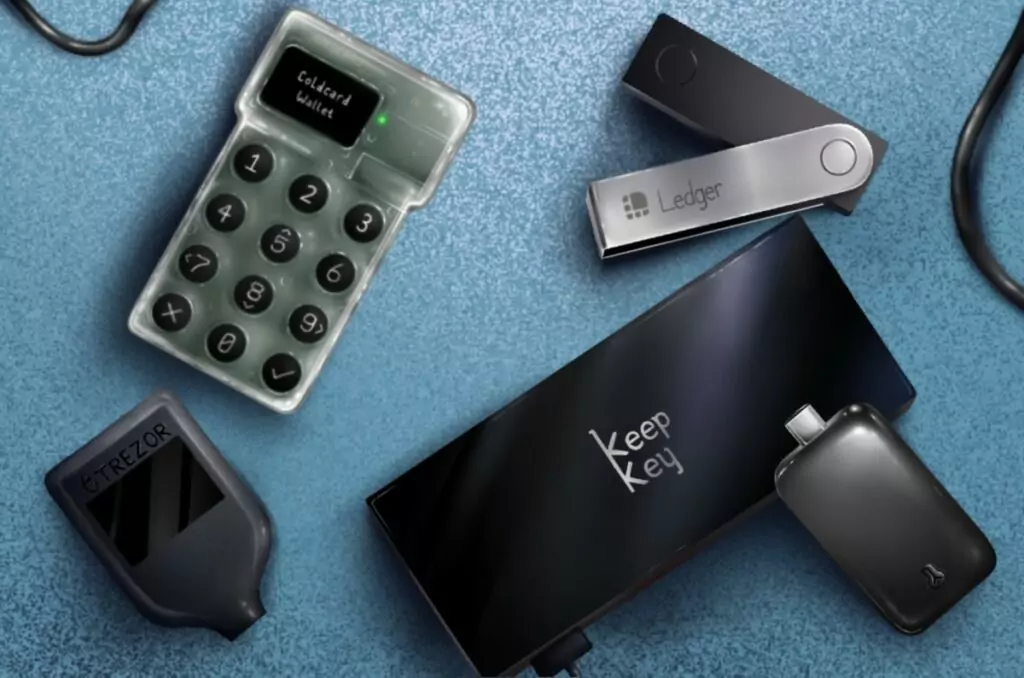
While there are many ways to hold your cryptocurrency assets, not all types of wallets are equal in terms of safety. While leaving your coins on centralized exchanges is undoubtedly the most convenient way, it is also the least safe way to hold your precious digital assets. There are countless tragic stories of how investors lost sizeable crypto portfolios because they kept it on an exchange that went bust, the last infamous example being the collapse of FTX in November 2022.
Compared to exchanges, even keeping your coins in web, mobile, or desktop wallets, where you are the owner of the private keys to your wallet, is a much safer option. Nevertheless, offline hardware wallets (also referred to as “cold storage”) are unequivocally the safest cryptocurrency storage method. Hardware crypto wallets are made of durable material and only connect with the network when you want to move the funds from or off them, which makes them extremely resilient to hacking attempts.
Here’s a quick look at the best crypto hardware wallets for 2024:
- Ledger Nano X – The best hardware wallet for most crypto holders
- Ledger Nano S Plus – A budget-friendly option from Ledger
- Trezor Model T – Trezor’s flagship model can back up the wallet seed
- ShapeShift KeepKey – A cheap hardware wallet that does not compromise on security
- Trezor Model One – A simple yet secure hardware wallet from Trezor
- Coinkite ColdCard Mk4 – A truly air-gapped crypto hardware wallet
- CoolWallet S – A highly portable credit card-like crypto wallet
- SecuX V20 – A robust wallet with dual connectivity and a large responsive touchscreen
- Keystone Pro – A secure hardware wallet powered by AAA batteries
- Shift Crypto BitBox02 – A crypto wallet capable of connecting to full Bitcoin nodes
- Bitkey – A Bitcoin hardware wallet with a unique design
- Blockstream Jade – An affordable yet powerful Bitcoin hardware wallet
The 12 best crypto hardware wallets in 2024: A detailed overview
Over the years, many different types and brands of hardware crypto wallets appeared on the market, which makes deciding on which one to buy increasingly difficult. Hardware wallets differ greatly in backup features, the number of supported blockchains, materials used, and also price. To make the decision at least a bit easier we have prepared an overview of the best crypto hardware wallets on the market today.
1. Ledger Nano X – The best hardware wallet for most crypto holders
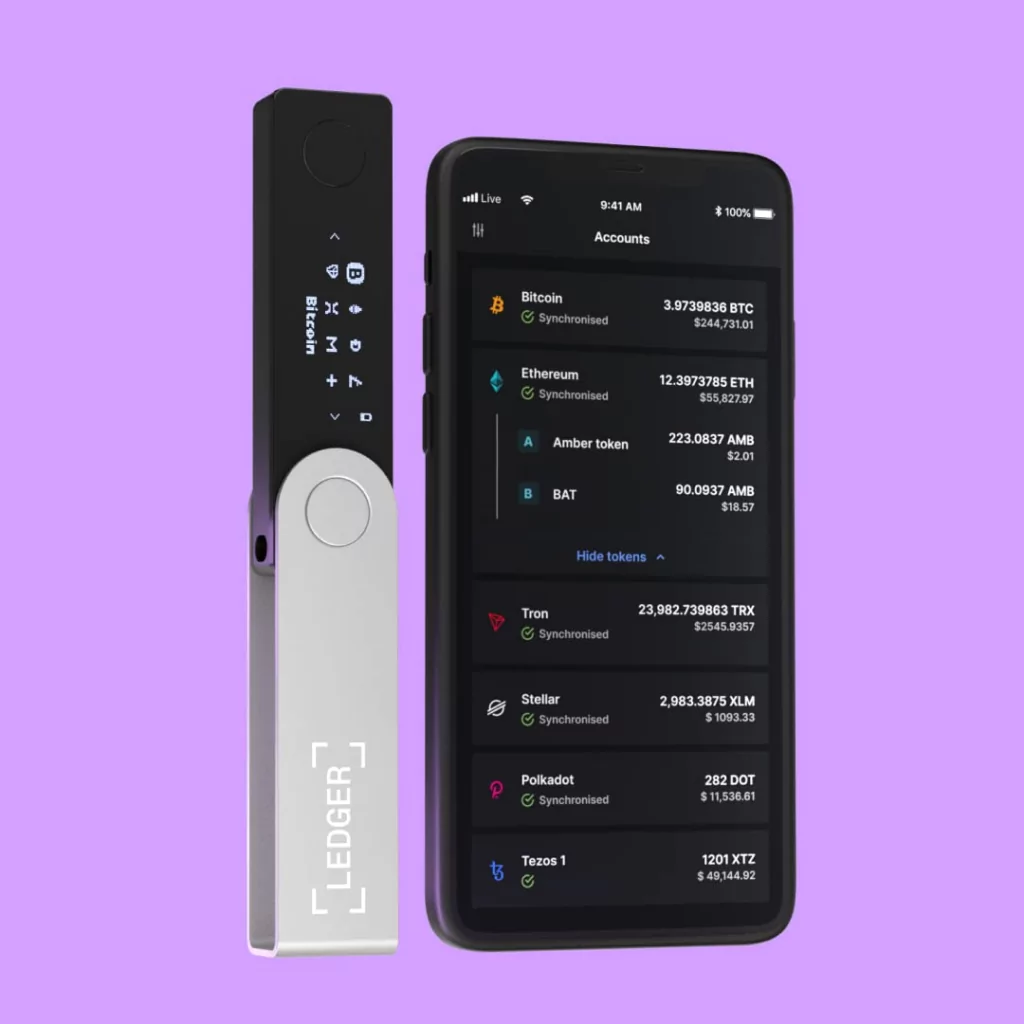
Ledger Nano X is the flagship product of French company Ledger and is often considered to be one of the best and most versatile cryptocurrency hardware wallets on the market. This hardware wallet boasts a CC EAL5+ certified secure element chip and supports over 5000 cryptocurrencies and is therefore a suitable storage option for almost any cryptocurrency user. In addition, Ledger Nano X is compatible with almost all popular operating systems, including Android, iOS, MacOS, Windows, and Linux. The hardware wallet can be connected either via USB or Bluetooth, one of the biggest differences that sets it apart from the Nano S.
The wallet uses Ledger’s proprietary Ledger Live software, which simplifies cryptocurrency management and seed phrase generation and restoration. A small display on the hardware wallet provides the user with immediate visual feedback, making processes more intuitive. In addition, the Nano X does not only support a huge number of cryptos but can also connect with a whooping 100 applications. Integration with hot wallets like Metamask and other Web3 wallets is another advantage of the Ledger Nano X, allowing users to access DeFi platforms and blockchain dApps.
Last but not least, Ledger’s hardware wallets have not been exploited or found to have vulnerabilities, which provides a good illustration of the company’s commitment to top-tier security standards. Although the market price of $149 sets Ledger Nano X among the more expensive crypto hardware wallets, the Nano X’s superior security and dApp integrations make it the best hardware wallet available in 2024
Pros:
- Full self-custody and control over private keys
- Open source code for transparency
- Very intuitive, attractive user interface
- Built-in exchange for top rates on coin swaps
- Based in privacy-protecting Switzerland
- Helpful developers provide direct support
- Fully free with no transaction fees (of course, except for blockchain miner fees)
Cons:
- Currently only adaptive web interface
- Limited language support at launch
- New project with a short track record so far
- Open source design means independent auditing is needed
2. Ledger Nano S Plus – A budget-friendly option from Ledger
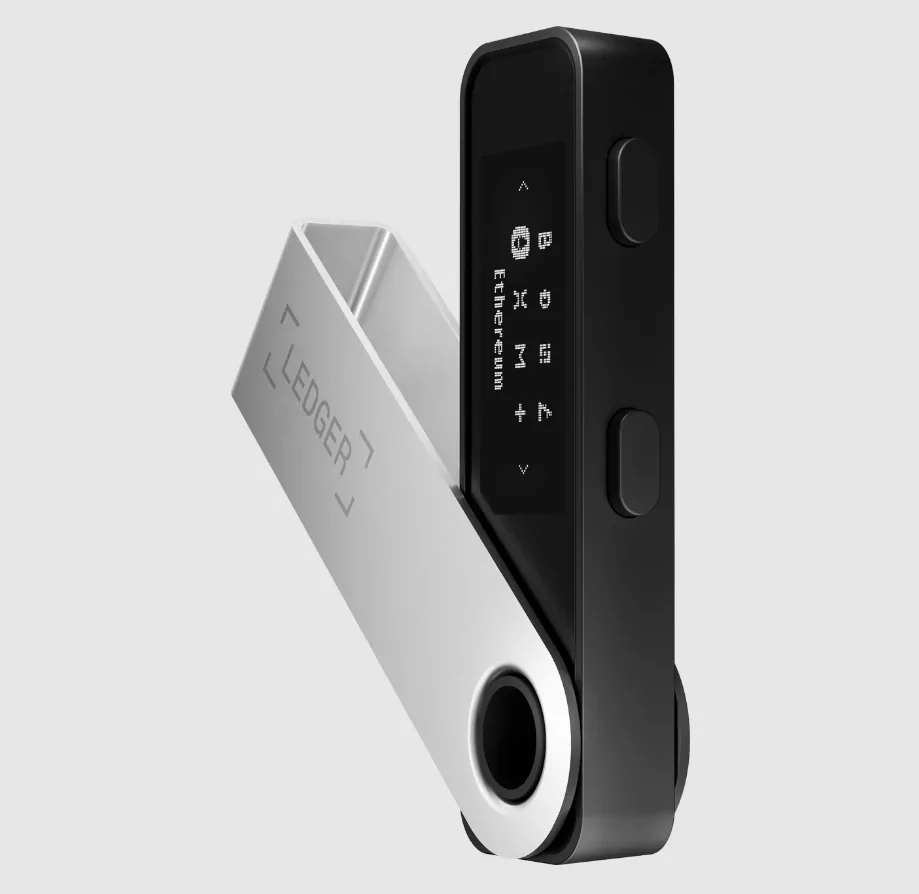
Ledger Nano S Plus is a highly secure hardware crypto wallet that offers many of the features of the more expensive Nano X but at a lower price point. Ledger Nano S Plus also supports over 5,500 cryptocurrencies and allows you to install up to 100 applications. It featured the same advanced security systems as its more expensive option, including a CC EAL5+ certified security element. This hardware wallet utilizes Ledger Live software that streamlines the process of creating a new wallet or transferring your old wallet to a new platform.
On the other hand, Ledger Nano S Plus has a storage capacity of 1.5 MB, which is slightly less than the Ledger Nano X, which has 2 MB. While most ordinary hardware wallet users should find 1.5 MB of storage more than enough, some might miss the Bluetooth support, which Ledger Nano S Plus also lacks. However, the USB-only connectivity of the Nano S Plus eliminates the need for a battery, which makes Ledger Nano S Plus extra light (it weighs only 21 grams). The wallet comes in five different colors, including Matte Black, Mystic White, BTC Orange, Deepsea Blue, and Ice.
The Ledger Nano S Plus is packed with features and is available at almost half of the price of the Nano X. This makes Ledger Nano S Plus one of the most popular hardware crypto wallets. In fact, the Nano S Plus seems to continue the legacy of its predecessor, the Nano S, which was a bestseller among hardware wallets, when it launched back in 2016.
Pros of Ledger Nano S Plus:
- Supports more than 5,500 cryptocurrencies
- Top-tier security (CC EAL5+ certified chip)
- Affordable (priced at $79)
- Among bestselling hardware wallets
Cons of Ledger Nano S Plus:
- No Bluetooth connectivity
- The device’s user interface and navigation can be complicated for novice users
3. Trezor Model T – Trezor’s flagship model can back up the wallet seed
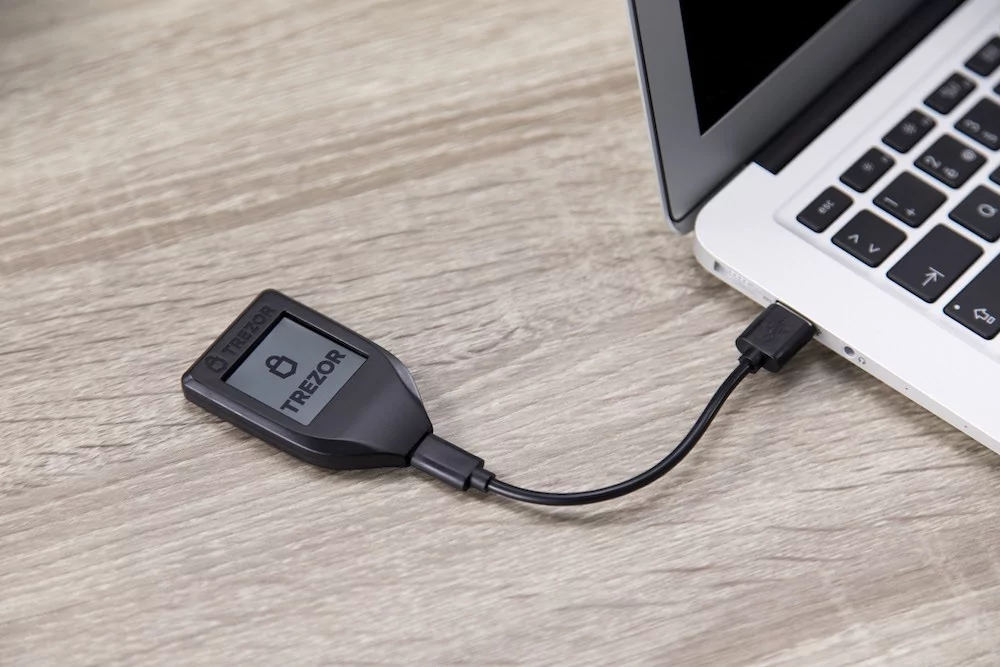
Trezor Model T is an advanced hardware wallet that is used for storing coins such as Bitcoin, Ethereum, and over 1200 other cryptocurrencies. Like other hardware wallets, this device is designed to keep your private keys safe from potential threats like hackers or malware. However, Trezor Model T is far more than just a hardware wallet. The device can also function as a two-factor authentication method and has an embedded password management function.
As far as the storage of crypto is concerned, there are only a few crypto wallets as versatile as the Trezor Model T. With this piece of hardware, you can manage multiple cryptocurrency accounts, store, and send funds, and even back up your wallet with a recovery seed. If you lose the hardware wallet, your funds may be recovered using a 12-word recovery phrase thanks to the use of Shamir Backup (SLIP39). Data on Trezor Model T is secured by an up to 9-digit long PIN code that the user chooses upon device set up. To access funds in the wallet, you need to input the correct PIN. In case you fail to enter the correct PIN code 16 times in a row, the wallet will automatically delete itself. The PIN is entered via Model T’s large touchscreen, that is also used to verify transactions and give out other visual feedback when interacting with the wallet.
In addition, Trezor’s flagship hardware wallet supports the storage of NFTs. It connects with other devices only through a USB-C port. The Model T is priced at $215, but its features and build quality make it a top contender among the best crypto hardware wallets on the market.
Pros of Trezor Model T:
- Top-tier security (PIN lock and wallet seed backup function)
- Password and digital identity management
- Suitable for NFT storage
- Interaction through the big color touchscreen
Cons of Trezor Model T:
- No iOS or Android apps
- Among the most expensive wallets ($215)
4. ShapeShift KeepKey – A cheap hardware wallet that does not compromise on security
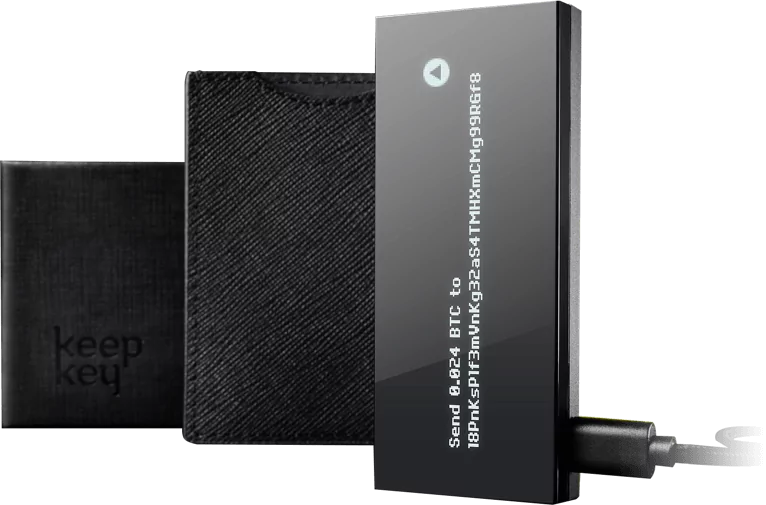
ShapeShift KeepKey is a sturdy hardware wallet that is among the cheapest hardware wallets on the market today. Although KeepKey devices sell for just $49 these wallets do not compromise on security. This ShapeShift’s product utilizes AES hardware encryption and 2-factor authentication, which puts its security on par with the wallets listed above. KeepKey can also deploy firmware updates without being connected to the internet. However, when you do need to connect the device to a computer and the internet, you should not have any problems as KeepKey supports most systems, including PC operating systems such as MacOS, Windows and Linux, and Android mobile operating systems. Through a large OLED display that occupies the entire front surface of the device, the user is constantly informed about what is going on with his wallet and transactions.
Nevertheless, every bargain comes with some trade-offs. In the case of ShapeShift’s KeepKey, the biggest disadvantage is the fairly limited support of different cryptocurrencies. You will be able to store Bitcoin, Bitcoin Cash, Bitcoin Gold, Litecoin, Ethereum (together with Ethereum-based tokens), Dogecoin, Dash, and nothing else. The wallet is also unable to integrate with Web3 wallets or DeFi applications. This means that even less advanced users with a diversified crypto portfolio might quickly find that the cheap KeepKey falls short of meeting all their needs. If you are, however, just looking for secure and cheap cold storage of the above-mentioned coins, KeepKey is definitely the hardware wallet to consider.
Pros of ShapeShift KeepKey:
- One of the cheapest hardware wallets on the market ($49)
- Large OLED screen
- Allows password entry and QR code viewing
- Open-source and simple-to-use software
Cons of ShapeShift KeepKey:
- Very narrow list of supported cryptocurrencies
- No support for Web3 wallet or dApp integration
- No multi-signature support
5. Trezor Model One – A simple yet secure hardware wallet from Trezor
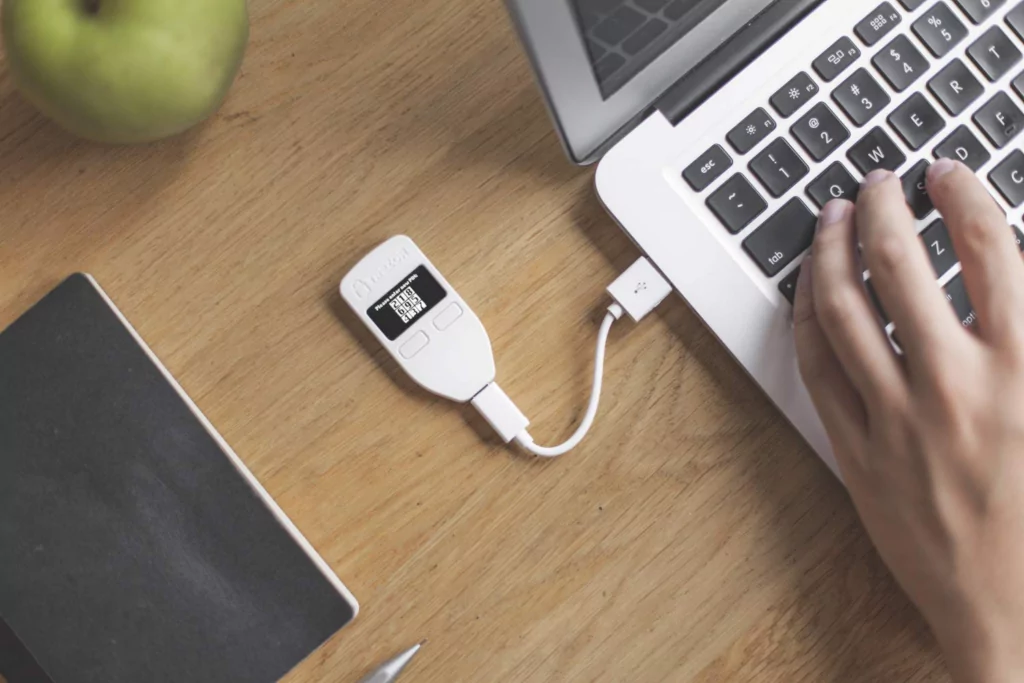
Trezor Model One stands out as a highly favored hardware wallet on the market due to its uncomplicated design and user-friendly interface. It supports a wide range of cryptocurrencies, including Bitcoin, Bitcoin Gold, Ethereum, and over a thousand other cryptocurrencies. However, it does not support some high-market cap coins that many have in their portfolios, such as XRP, ADA, EOS, XTZ, and XMR. To ensure the utmost security for your digital assets, Trezor provides several additional security features, such as PIN codes and passwords. These measures offer robust protection for your funds, making it nearly impossible for hackers to gain unauthorized access even if your wallet is lost or stolen.
At just $69, the Trezor One is also affordable, making it an excellent value for those seeking a simple yet powerful hardware wallet. If you’re looking for a user-friendly device with minimal options, the Trezor Model One is an excellent choice.
Pros of Trezor Model One:
- Top-tier security (PIN lock and wallet seed backup function)
- Password and digital identity management
- Suitable for NFT storage
- Interaction through the big color touchscreen
Cons of Trezor Model One:
- No iOS or Android apps
- Among the most expensive wallets ($215)
6. Coinkite ColdCard Mk4 – A truly air-gapped crypto hardware wallet
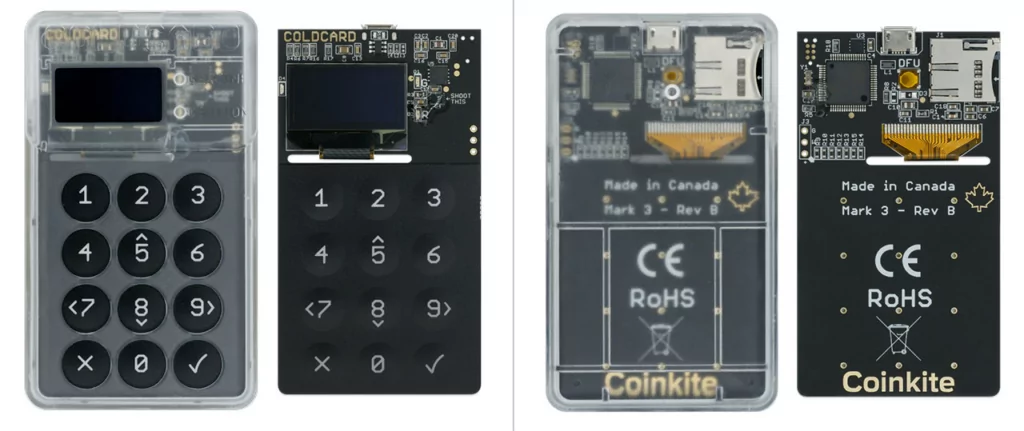
ColdCard Mk4 is a maximum-security hardware cryptocurrency wallet produced by the Canadian crypto hardware manufacturer Coinkite. It is one of the rare hardware wallets that can be used without ever being connected to a computer, as everything from wallet creation with seed generation to transaction signing can be done without connection thanks to the natively implemented PSBT (BIP174). Nevertheless, the ability to connect to a computer exists thanks to the USB-C connector at the bottom edge of the device. ColdCard Mk4 includes two secure elements, supplied by two different manufacturers, which additionally minimizes unknown vulnerability risks. The PIN is also entered through a full-size numeric keypad, which is a bit old-school but practical and a bulletproof input method.
ColdCard Mk4 only supports Bitcoin, but the security and utilities of this Bitcoin cold storage are unrivaled. The device features expanded multi-sig capabilities allowing it to handle big and complex Bitcoin transactions. In Coinkite’s official store, this device has a price tag of $148.
Pros of Coinkite ColdCard Mk4:
- Full-sized physical numeric keypad
- Bright OLED display
- Two independent security elements
- A truly air-gapped hardware wallet
- MicroSD card support for backup and data storage
Cons of Coinkite ColdCard Mk4:
- A Bitcoin-only hardware wallet
7. CoolWallet S – Highly portable credit card-like crypto wallet

CoolWallet S is a portable and durable crypto hardware wallet that stands out from its competition mainly due to its design. It comes in the form of a credit card-sized device, that has a thickness of only 0.8 mm and weighs only 6 grams. In addition, this “crypto card” is also waterproof and tamper-resistant. The wallet features a small built-in screen and a button, which is used to confirm transactions. According to the manufacturer, the device should last up to 3 months with a single battery charge.
The wallet connects via an encrypted Bluetooth connection to most mobile devices. On top of the advanced encryption standard AES256 that secures the wireless connection, the device utilizes both biometric and physical 2FA checks to ensure your assets’ safety and has an embedded EAL5+ certified secure element. Nevertheless, the device is easy to interact with and allows a new cold wallet to be created in under 5 minutes due to the simplicity and intuitiveness of the user interface. Furthermore, the wallet features a built-in cryptocurrency swap system. You will have to spend $99 to buy one sleek CoolWallet S but the company offers a small discount if you buy two devices. If you convince a friend to buy it, too, you will have to part with only $89 per device (or $178 for both hardware wallets).
Pros of CoolWallet S:
- Highly portable due to its unique credit card-like design
- Easy-to-use interface
- Encrypted Bluetooth connection
- Long-lasting battery (up to 3 months)
Cons of CoolWallet S:
- Limited cryptocurrency support
8. SecuX V20 – A robust wallet with dual connectivity and a large responsive touchscreen

SecuX V20 is a robust and stylish cryptocurrency hardware wallet with many useful features and a premium feel. The V20 supports over 1000 cryptocurrencies, including Bitcoin, Tether, Litecoin, Ethereum, and Stellar, and has a responsive color 2.8″ touchscreen to ensure smooth interaction. The wallet, which supports multiple operating systems, can connect either via an encrypted Bluetooth connection or a wired USB connection. When you want to establish a connection between your hardware wallet and another device via Bluetooth or USB, the connection needs to be approved on the online interface called SecuXcess, which can be found within SecuXTech.
SecuX V20 allows for the private keys to be created and stored offline but can also integrate with third-party wallets or apps if needed. Private keys and PIN codes are stored on an EAL 5+ certified secure chip. When turning on the SecuX V20 for the first time, the user is prompted to set a 4-digit PIN code, which is later used to interact with the wallet and confirm a transaction. Another rigorous safety measure that many hardware wallets, including V20, employ is the complete wipe-out of data on the device if an incorrect PIN code is entered 4 times in a row. The device allows users to create hidden wallets, which adds an extra layer of security. You can also set a really strong password, as the device supports hidden wallet passwords up to 99 characters long. SecuX V20 has a price tag of $120.
Pros of SecuX V20:
- 2.8″ highly responsive color touchscreen
- Support for multiple passwords and multiple signatures
- Support for most PC operating systems, Chrome, iOS, and Android
- USB and encrypted Bluetooth connectivity
- Hidden wallet feature
Cons of SecuX V20:
- A bit complicated interface
- The bulky design makes it less portable
9. Keystone Pro – a secure hardware wallet powered by AAA batteries
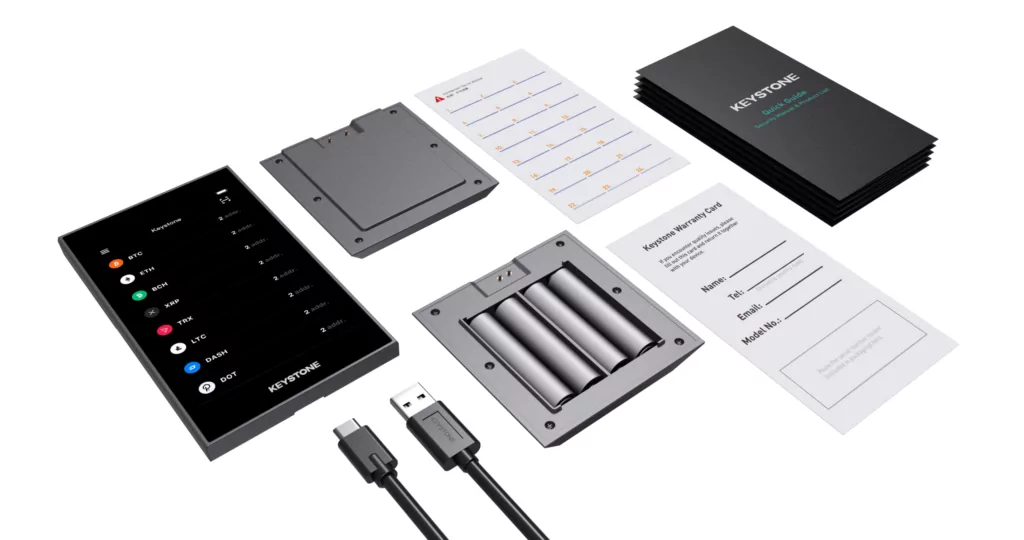
Keystone Pro is an air-gapped hardware wallet with a range of security-focused features, including an advanced fingerprint biometric authentication system. The device supports wallet backup using Shamir backups and will self-destruct wallet keys if it detects tampering attempts. This hardware wallet is exclusively air-gapped. It cannot be connected via Bluetooth or USB even if you wanted to, as it does not support such connections. Transactions are conducted through the use of a camera and QR codes, while the device also has a 4-inch color touchscreen that displays information about transactions and wallet addresses.
Keystone Pro is available for purchase at the price of $169. Keystone also offers an Essential version of their crypto hardware wallet. Lacks fingerprint authentication, a self-destruct function, and rechargeable batteries, the Keystone Essential is priced at $119.
Pros of Keystone Pro:
- Large touchscreen and camera
- Support for air-gapped transactions
- Long battery life (powered by 4 AAA batteries)
Cons of Keystone Pro:
- A small onscreen keyboard makes password input difficult
- Bad build quality and cheap materials
- No Bluetooth or USB connectivity
- Fairly expensive ($169)
10. Shift Crypto BitBox02 – Crypto wallet capable of connecting to full Bitcoin nodes
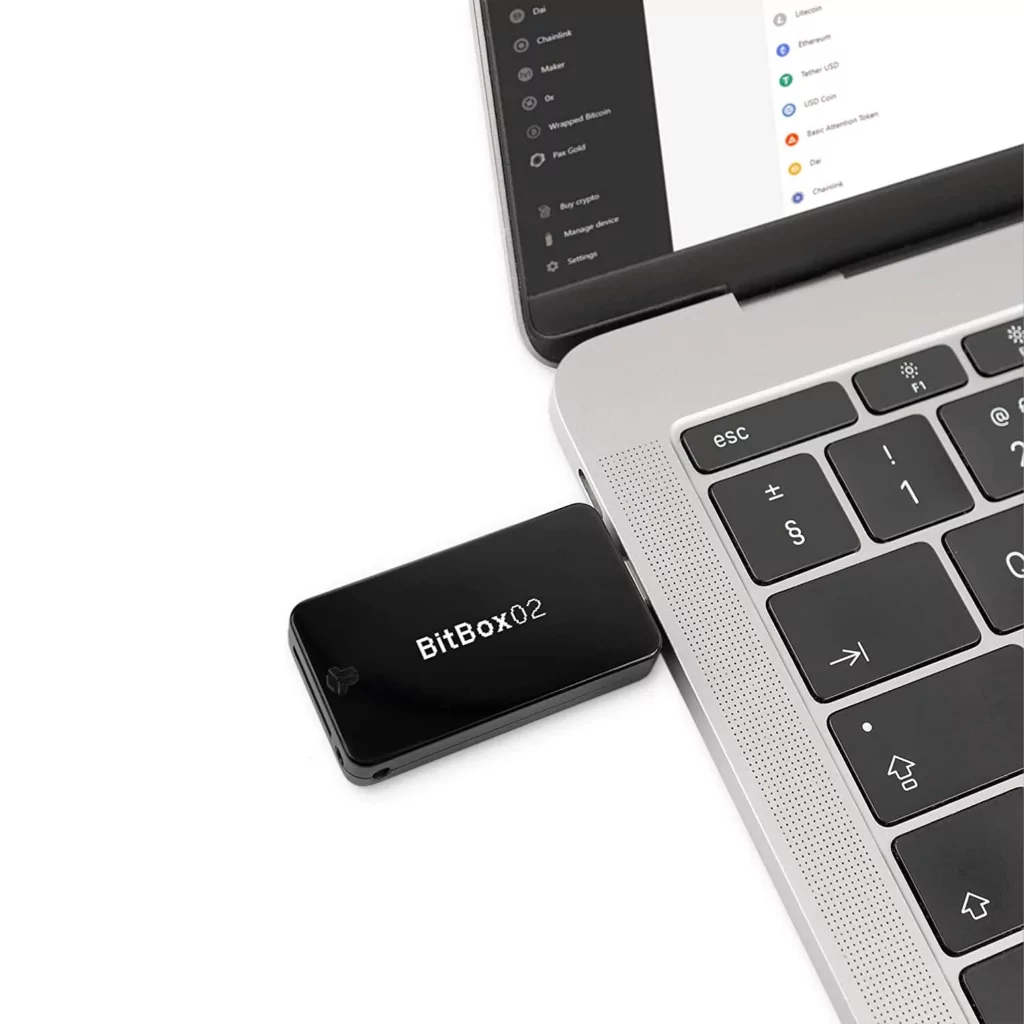
BitBox02 is a simple and easy-to-use but secure cryptocurrency wallet that supports the most popular cryptos such as Bitcoin, Ethereum, and Litecoin but also more than 1500 less-known ones. The hardware wallet is controlled through the BitBoxApp, which features a straightforward user interface. The App’s and BitBox02’s source code is open-source and has been audited by an independent security company.
This hardware wallet, which is produced by Shift Crypto in Switzerland, employs high-level security measures, and has a dual-chip design to further increase the security of the crypto storage. What sets BitBox02 apart from most other wallets is the ability to use a microSD card with the wallet’s backup information, thus eliminating the need to enter a 12- or 24-word phrase every time you want to run the wallet. In addition, when connecting to the wallet through the BitBoxApp, users can opt into Tor forwarding, which further increases the security and privacy of the wallet. Worry not, the communication between your computer and your hardware wallet is also encrypted, which minimizes the risk of man-in-the-middle exploits and attacks. For Bitcoin purists, BitBox02 is also available as a Bitcoin-only firmware, which removes ballast code and further reduces the risk of exploits.
Pros of Shift Crypto BitBox02:
- OLED display and responsive touch controls
- Open-source externally audited source code
- Tor forwarding feature
Cons of Shift Crypto BitBox02:
- No app for iOS devices
- Rather expensive (139€ or $153)
11. Bitkey – A Bitcoin hardware wallet with a unique design

Bitkey is a hardware wallet for Bitcoin created by Block, the company behind financial services platform Square and mobile wallet Cash App. Although Block is best known for its products in the world of fiat currency and traditional finance, the company certainly has deep expertise on Bitcoin (Cash App was one of the first mainstream financial apps to integrate support for Bitcoin).
This is clearly displayed by the Bitkey hardware wallet, which comes in a unique form factor and is designed to make the experience of securely owning and transacting with BTC as seamless as possible. To increase security and reduce the likelihood of users losing access to their Bitcoin, Bitkey incorporates a recovery suite consisting of three-key security, cloud recovery and trusted contacts.
Bitkey functions as a multisig (multi-signature) wallet, where 2 out of 3 signatures are required to approve a transaction. One private key is stored on the user’s phone, one is stored in the Bitkey itself, and one private key is stored in the cloud. Notably, the private keys stored on the user’s phone and in the cloud cannot be used to authorize a BTC payment greater than a limit specified by the user.
While Bitkey delivers a very fresh take on hardware wallets, one of its biggest downsides is its price. At $150, the hardware wallet is substantially more expensive than options such as the Ledger Nano S Plus, despite only supporting Bitcoin.
Pros of Bitkey:
- Multisig functionality
- Unique and visually appealing design
- Multiple recovery options provide additional peace of mind
- Seamless integration with the Bitkey app
Cons of Bitkey:
- Relatively high price point considering it only supports one cryptocurrency (Bitcoin)
- Some users might be uncomfortable with having a private key stored in the cloud
12. Blockstream Jade – An affordable yet powerful Bitcoin hardware wallet
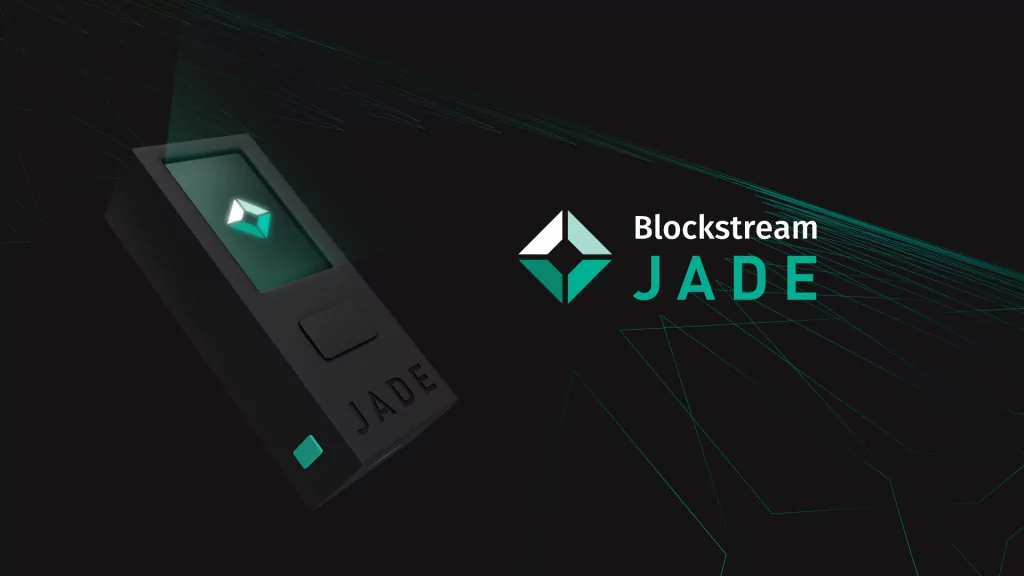
Blockstream Jade is a feature-packed crypto hardware wallet, although it’s important to note that it exclusively supports Bitcoin and the Liquid sidechain. This wallet is developed by Blockstream, one of the most prominent developers of Bitcoin-related software in the world. Priced at just $65, the Blockstream Jade provides a very strong combination of affordability and functionality.
This wallet features a built-in camera for QR code scanning and a display, enhancing its security. The camera allows users to sign transactions without the need for a Bluetooth or USB connection, minimizing exposure to potential security risks. However, for those who prioritize convenience, the wallet still offers connectivity options via USB or Bluetooth.
Despite its limitation to Bitcoin and the Liquid sidechain, the Blockstream Jade is compatible with a wide range of Bitcoin wallet applications. This includes Electrum, Blockstream Green, BlueWallet, among others, allowing users to integrate it seamlessly with their Bitcoin wallet software of choice.
Pros:
- Excellent value for money
- Built-in camera and display
- Option to use Bluetooth or USB
- Created by one of the world’s leading Bitcoin development companies
Cons:
- Only supports Bitcoin and the Liquid sidechain
The bottom line: There are plenty of options on the market for keeping your crypto safe
By selecting a hardware wallet with a secure backup system that is built out of robust and durable materials, users can be confident that their crypto assets are safeguarded. It is also of key importance to check that the hardware wallet of your choosing supports all your favorite cryptocurrencies.
The prices of commercial cryptocurrency hardware wallets range from around $50 to more than $200. But even the purchase of an expensive high-end hardware wallet packed with security features should not be hard to justify if you are holding a large crypto portfolio. If, however, your portfolio is considered small, you only hold a small number of different coins and rarely interact with DeFi apps, you could do just fine with a lower-end hardware wallet.
Just remember that each and every hardware wallet featured on our list is incomparably safer than keeping your coins on an exchange. Do remember (and live by) the age-old crypto saying: “Not your keys, not your coins!”



